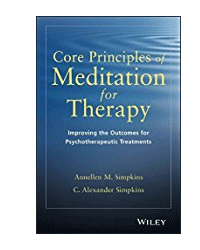“Core Principles of Meditation for Therapy: Improving the Outcomes for Psychotherapeutic Treatment.”

“Core Principles of Meditation for Therapy: Improving the Outcomes for Psychotherapeutic Treatment.”
By Annellen M. Simpkins & C. Alexander Simpkins
John Wiley & Sons
Hoboken, N.J 2016
Book offers techniques to improve client well-being
Reviewed by Kerry Morrison, Psy.D.
In the last decade, the psychotherapy world has been excited about using mindfulness and meditation in therapy with clients. Many psychotherapists who have their own meditation practices have long thought about integrating body mind techniques with their existing psychotherapy strategies.
The authors of “Core Principles of Meditation for Therapy: Improving the Outcomes for Psychotherapeutic Treatment,” are psychologists who have integrated meditation and mindfulness into their psychotherapy practices and have found that this technique has increased the efficacy of therapy. This premise is also supported by current research.
Studies on meditation and mindfulness have found that techniques can increase alertness and calmness while decreasing anxiety and stress. Enhanced feelings of well-being, happiness and emotional and self-regulation has also been demonstrated.
The blending of body-mind techniques with psychotherapy interventions has been found to significantly enhance clinical outcomes.
The American Psychological Association has stated that most psychological disorders place extra demands on the nervous system, placing the body in an over-activated state of stress. Treating the stress will return the nervous system to balance and will help ease the existing psychological condition or disorder, according to the authors.
In addition, new findings in neuroscience research show that meditation is a method that activates positive brain change through neuroplasticity and neurogenesis.
For some time now, researchers have known that trauma can change brain function by shrinking the hippocampus, but new neurons can grow as a result of stimulating or enriching experiences such as psychotherapy.
In this multi-media publication, (available in book, CD or DVD formats), the authors discuss the usefulness of gratitude in psychotherapy.
They also present three types of meditations (Focus, Open-focus and No-focus meditations), with examples that can be utilized. Also provided are meditations that can be applied to specific psychological disorders such as depression, anxiety, bipolar, trauma and substance abuse.
This book also offered one of the best descriptions of the developing adolescent brain that I have found.
I highly recommend this book for any psychotherapy practitioner that has an interest in increasing clinical efficacy and improving client well-being. This book offers the tools that really make a difference that clients often ask for that can be used in and outside of therapy.
Kerry Morrison, Psy.D., is a psychologist for the Department of Developmental Services in the Central/West Region of Mass., who also has a private practice, consults, teaches and provides training on a range of mental health topics.
Learn more about the book: Core Principles of Meditation for Therapy: Improving the Outcomes for Psychotherapeutic Treatments
